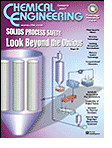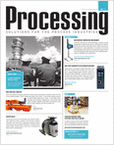Display problem ? Click HERE
Recommended :
- Subscribe FREE - Processing Magazine
- Tips on Succession in FREE Subscription
 A pressure relief valve (PSV) is provided to protected a pressure containment system i.e. vessel and the vessel is designed for ASME Section VIII. There are several credible non-fire relieving scenario and fire scenario. The relieving flow for each scenarios and required relieving "orifice" area and size have been calculated. (sizing may refer to on API RP 520 PI - Ed 7 - Jan 2000 RP - Sizing, Selection & Installation of Pressure-Relieving Devices in Refinery). PSV datasheet for most severe condition has been submitted to PSV vendor. Vendor proposed a PSV "orifice" size with stamped capacity with steam. How do you check and confirm if this PSV is sufficient ?
A pressure relief valve (PSV) is provided to protected a pressure containment system i.e. vessel and the vessel is designed for ASME Section VIII. There are several credible non-fire relieving scenario and fire scenario. The relieving flow for each scenarios and required relieving "orifice" area and size have been calculated. (sizing may refer to on API RP 520 PI - Ed 7 - Jan 2000 RP - Sizing, Selection & Installation of Pressure-Relieving Devices in Refinery). PSV datasheet for most severe condition has been submitted to PSV vendor. Vendor proposed a PSV "orifice" size with stamped capacity with steam. How do you check and confirm if this PSV is sufficient ?
- Subscribe FREE - Processing Magazine
- Tips on Succession in FREE Subscription
Background
The capacity of a safety or relief valve in terms of a gas or vapor other than the medium for which the valve was officially rated shall be determined by application of the following formulas :
The capacity of a safety or relief valve in terms of a gas or vapor other than the medium for which the valve was officially rated shall be determined by application of the following formulas :
For air :
Wa = CKAP sqrt(M/T) Eq. [1a]
with
C = 356
M = 28.97
T = 520 R when Wa is the rated capacity
For steam :
Ws = 51.5KAP Eq. [1b]
For any gas/vapor :
W = CKAP sqrt(M/T) Eq. [2]
where :
Wa = rated capacity, converted to lb / hr of air at 60°F, inlet temperature
Ws = rated capacity, converted to lb/hr steam
W = flow of any gas or vapor, lb / hr
C = constant for gas or vapor which is function of the ratio of specific heats, k = Cp / Cv
K - coefficient of discharge
A = actual discharge area of the safety valve, sq in.
P = (set pressure × 1.10) plus atmospheric pressure, psia
M =molecular weight
T = absolute temperature at inlet (°F + 460)
Constant C can be evaluated with the following chart and equation.
Recommended :
- Subscribe FREE - Processing Magazine

Case
A PSV is required to relieve 1000 lb/h of Ammonia (M = 17.03) with a set pressure of Ps, inlet temperature of 150 degF (at 110% of Ps) and k=1.33. Vendor A has proposed a PSV A with stamped capacity of 950 lb/h at pressure same as 110% of Ps. Vendor B has proposed a PSV B with stamped capacity of 1200 lb/h at pressure same as 160% of Ps. Please check if the proposed PSV A and/or PSV B is sufficient.
W = 1000 lb/h
M = 17.03
T = 150 degF = 150+460 R = 610 R
k = 1.33
C = 520 sqrt [k(2/(k+1)^(k+1)/(k-1)] = 349.8 (say ~350)
From Eq. [2],
==> KA = 1000 / [350 sqrt(17.03 / 610)]
==> KA = 17.1 / 1.1Ps
For PSV A
From Eq. [1b],
Ws = 51.5KAP
==> Ws = 51.5 (17.1 / 1.1 Ps) (1.1 Ps)
==> Ws = 881.2 lb/h
The required equivalent steam flow at pressure of 1.1Ps is 881.2 lb/h.
Proposed PSV A with stamped capacity of 950 lb/h steam is more than 881.2 lb/h steam. Thus, the proposed PSV A is sufficient.
For PSV B
From Eq. [1b],
Ws = 51.5KAP
==> Ws = 51.5 (17.1 / 1.1 Ps) (1.6 Ps)
==> Ws = 1281 lb/h
The required equivalent steam flow at pressure of 1.6Ps is 1281 lb/h.
Proposed PSV with stamped capacity of 1200lb/h steam is less than 1281 lb/h steam. Thus, the proposed PSV B is insufficient.
One shall take note that the KA for steam and gas/vapor are usually (but not always) same. It can be considered same.
Concluding remark
Above briefly discuss the relationship between a PSV relieving and PSV stamped capacity. A stamped capacity is a useful equivalent parameter to relates it to any relieving fluid & load.
Related Post
M = 17.03
T = 150 degF = 150+460 R = 610 R
k = 1.33
C = 520 sqrt [k(2/(k+1)^(k+1)/(k-1)] = 349.8 (say ~350)
From Eq. [2],
W = CKAP sqrt(M/T)
==> 1000 = 350 KAP sqrt(17.03 / 610)==> KA = 1000 / [350 sqrt(17.03 / 610)]
==> KA = 17.1 / 1.1Ps
For PSV A
From Eq. [1b],
Ws = 51.5KAP
==> Ws = 51.5 (17.1 / 1.1 Ps) (1.1 Ps)
==> Ws = 881.2 lb/h
The required equivalent steam flow at pressure of 1.1Ps is 881.2 lb/h.
Proposed PSV A with stamped capacity of 950 lb/h steam is more than 881.2 lb/h steam. Thus, the proposed PSV A is sufficient.
For PSV B
From Eq. [1b],
Ws = 51.5KAP
==> Ws = 51.5 (17.1 / 1.1 Ps) (1.6 Ps)
==> Ws = 1281 lb/h
The required equivalent steam flow at pressure of 1.6Ps is 1281 lb/h.
Proposed PSV with stamped capacity of 1200lb/h steam is less than 1281 lb/h steam. Thus, the proposed PSV B is insufficient.
One shall take note that the KA for steam and gas/vapor are usually (but not always) same. It can be considered same.
Concluding remark
Above briefly discuss the relationship between a PSV relieving and PSV stamped capacity. A stamped capacity is a useful equivalent parameter to relates it to any relieving fluid & load.
Related Post
- Thermal Relief of Non-Flashing Liquid in Pipe
- Back Pressure Affect Conventional PSV Set Pressure : Case Study #2 - Non-Bonnect Vent
- Back Pressure Affect Conventional PSV Set Pressure : Case Study #1 - Bonnect Vent to ATM
- How Back Pressure Affect Conventional PSV Set Pressure Subject to It Vent
- Several Impact of Backpressure on Conventional PSV
- Simple Flow Chart to Determine Requirement of Thermal Relief
No comments:
Post a Comment